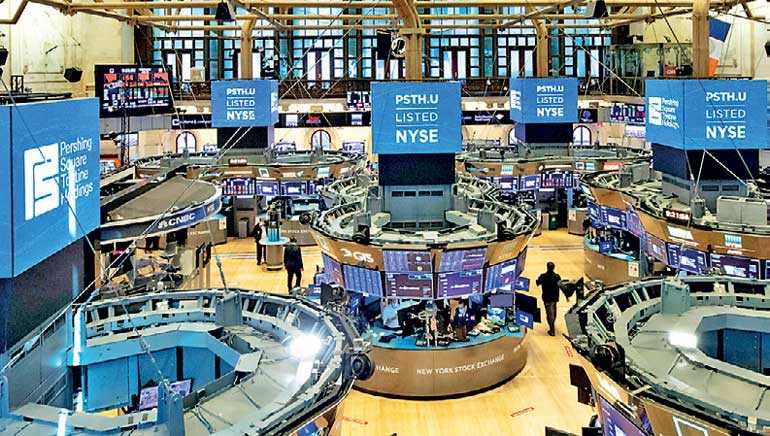Sunday Feb 22, 2026
Sunday Feb 22, 2026
Tuesday, 29 December 2020 00:39 - - {{hitsCtrl.values.hits}}

REUTERS: Global shares climbed yesterday after US President Donald Trump signed into law a $ 2.3 trillion pandemic aid and spending package, backing down from his earlier threat to block the bipartisan bill.
Markets cheered the move as it will restore unemployment benefits to millions of Americans and avert a federal Government shutdown in the world’s largest economy.
“As the coronavirus pandemic has shown little sign of abating, the emergency aid was needed to avoid a sharp slowdown in the economy during the first quarter,” said Nobuhiko Kuramochi, market strategist at Mizuho Securities. “It would have been unsettling if we hadn’t had it by the end of year.”
US S&P futures rose 0.62% in their first trade after Christmas holiday, edging near a record touched last week.
The futures had earlier reversed losses after a cryptic tweet by Trump – “Good news on Covid Relief Bill. Information to follow” – helped offset worries about further delay in stimulus spendings.
European shares are expected to follow suit, with Euro Stoxx 50 futures rising 0.42%, though many markets including London will be closed yesterday.
Japan’s Nikkei inched up 0.74%. MSCI’s broadest index of Asia-Pacific shares outside Japan rose 0.20%, but trade is slow with many markets still closed.
“It is positive for markets that we no longer have a chaos over stimulus, considering there was a chance of a partial government shutdown,” said Masahiro Ichikawa, chief strategist at Sumitomo Mitsui DS Asset Management.
“But on the other hand, markets have talked about that stimulus for a long time and I would say most of it has been already priced in.”
US bond yields edged up, with the 10-year US Treasuries yield up 1.5 basis point at 0.945%.
The rollouts of COVID-19 vaccines are also bolstering hopes of more economic normalisation next year, with Europe launching a mass vaccination drive on Sunday.
That for now has offset alarms over a new highly infectious variant of the virus that has been raging in the south-east of England and was confirmed in many other countries, including Japan, France and Canada, over the weekend.
Major currencies were little changed.
The dollar is widely expected to stay under pressure against other riskier currencies as investors bet on continued recovery in the global economy and a prolonged period of loose U.S. monetary policy.
The euro traded at $ 1.2221, a tad below its 2-1/2-year high of $ 1.22735, while the yen changed hands at 103.42 per dollar.
The British pound changed hands at $ 1.3571, not far from a 2-1/2-year high of $ 1.3625 hit earlier this month after Britain and the European Union reached an agreement on trade framework after Brexit.
Precious metals were livelier as gold jumped more than 1% to $ 1,899.7 per ounce and silver gained about 3% to $ 26.62 per ounce.
“The US stimulus package will boost the economy and lead to risk-on trades and a weaker dollar, which should support gold,” said Tatsufumi Okoshi, a senior commodity strategist at Nomura Securities.
Bitcoin also extended gains over the weekend to reach a new high of $ 28,377.94 before stepping back to $ 27,068, bringing the total value of the cryptocurrency in circulation to over $ 500 billion.
Oil prices edged down a tad, with US crude futures down 0.3% at $ 48.09 per barrel.